Amazon Promise: Sustainable Health for Peru
Start of an Idea
Patty Webster is not a medical professional.
But one day, while working as a tour guide in the Peruvian Amazon rainforest, she found herself using a traveler's sewing kit to close a wound on a boy from a local village.
Word had long since gotten around among the people in this woefully underserved area that the young American was handy with a first-aid kit and willing to help them. Ms. Webster managed to help many people (including the village boy, whose stitches healed nicely), but her unexpected stint as an amateur surgeon crystallized her empathy into resolve.
She knew she needed help, so she began recruiting medical and non-medical volunteers as part of her plan to improve health care in the place she had come to love. Thanks to her clear-headed sense of responsibility, hard work and infectious enthusiasm, Ms. Webster began bringing medical expeditions to the Upper Amazon Basin of Peru in 1993, and has continued ever since.
Formally incorporated as a U.S. non-profit in 2004 with a six-member board of directors and a staff of American and Peruvian program directors and advisors, Amazon Promise sends several interdisciplinary health care teams and shipments of medical supplies to Peru each year.
Organic Growth
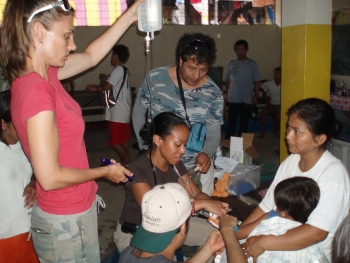
Amazon Promise's mission -- providing health education and giving essential medical care to the people of Loreto Province in northeastern Peru -- has not changed, but it has grown organically over the years. Its outreach has expanded to include 32 villages as well as the provincial capital, Iquitos; added medical student, dentistry and HIV education programs; and is working with Engineers Without Borders to build a modern clinic in Belèn, the poverty-stricken river port next to Iquitos.
Amazon Promise also remains an organization with a personal touch. Ms. Webster still takes a hands-on approach to her work, living most of the year in Iquitos. She regularly works in the organization's mobile clinics, lending a hand where she can. With help from her Peruvian team, she also communicates with the Peruvian government in tricky matters such as customs clearance for supplies and setting up clinics in indigenous areas.
Challenging, Isolated Environment
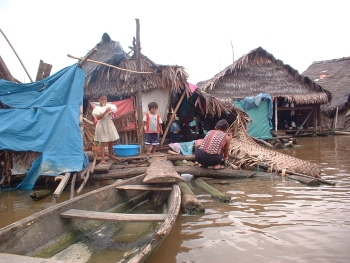
The climate and terrain make this jungle region both beautiful and dangerous. There are two seasons: high-water and low-water. The rivers rise and fall some 25-50 feet each year, creating a spectacular change in the lush scenery.
But five months of high water bring crowded conditions, sanitation problems, biting snakes and, inevitably, disease. Even in urban Belèn, neighborhoods become flooded and people must get around by boat or on makeshift boardwalks. Low-water season is muddy rather than dry, and the lack of clean drinking water and modern sanitation are constant public health problems.
At any time of the year, the region is difficult to reach from the outside world. Iquitos is a city of 350,000, yet it is accessible only by plane or boat. Relatively nearby areas are difficult to reach even from Iquitos.
In February 2009, Ms. Webster will lead an expedition to hold a clinic for the Aguarunas Indians. To reach them will take several hours by plane, bus and helicopter.
Between the weather and the isolation, it is not surprising that Loreto is a poor, underserved province. Iquitos has a hospital, but its services are basic and not affordable for many. In the villages, if there is health care at all, it is provided by a shaman and a midwife.
Cultural differences can also be a barrier to outsiders who wish to bring aid, especially in the indigenous areas. Amazon Promise has a daunting task, but it has had success because of its consistent presence in Loreto with a Peruvian staff as well as a lifeline to the U.S. in the form of its board, program directors and other volunteers.
It Takes Volunteers
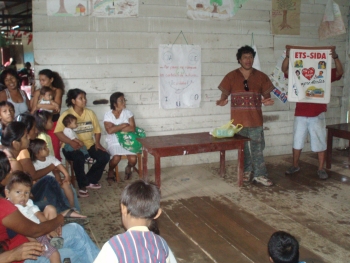
Volunteers are the lifeblood of Amazon Promise, and they find the organization through Web searches and word of mouth. Many of them end up making multiple trips or becoming regular staffers.
All of the board members started as volunteers. Jacqueline Carroll, a nurse practitioner from Massachusetts, took her first trip in 1998. She returned frequently and later became Amazon Promise's Treasurer and Volunteer Coordinator.
New services such as the dental program exist because the organization encourages people to "have an idea and run with it," as Ms. Webster puts it.
Expedition volunteers enthusiastically spread the word after their experiences. Mark L. Smith, MD, a New York City-based plastic surgeon, had been looking for an overseas volunteer opportunity while still a resident. He went on his first trip in 1993 after Ms. Webster told him about her efforts. Since then he has been back to Peru and recruited various friends and colleagues, including Veda Wong Sing, a physician assistant who looks forward to her next trip.
Welcoming All Healthcare Professionals
The trips are structured in a way that allows a wide variety of people to volunteer. Amazon Promise is unusual in that it welcomes other health care professionals besides physicians, nurses and medical students. Ms. Wong Sing had had trouble finding a volunteer organization that had a role for physician assistants and was glad to find out about Amazon Promise. Non-medical volunteers also have a role, registering patients and keeping medications organized and accessible to the clinicians.
There are options for those who cannot take a great deal of time away from their jobs or who are not quite ready for the deep jungle. Ms. Wong Sing, who had never even been camping before her 2007 trip to Peru, found that a one-week city expedition was the perfect introduction to this kind of work. There are also two-week trips to the jungle, and three- and four-week medical student internships in both the city and the jungle. The volunteers are a diverse group; they have been as young as 10 and as old as 80 and come from all parts of the U.S. as well as the U.K. and other countries.
Working Together
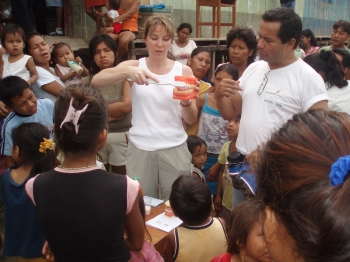
The interdisciplinary medical team at each Amazon Promise clinic includes volunteers who pay their own way from the developed world and volunteer physicians and translators from Iquitos. When teams visit jungle villages, they either bring a shaman or work with the resident shaman; he provides medical care and serves as an important cultural liaison.
Each clinician sets up shop at his or her own table, and patients have the choice of who to see, and of traditional or modern treatments. This choice is a significant show of respect for the local culture, but it also gives patients a wider range of viable treatment options, because traditional remedies may be preferable for certain ailments.
The team members, despite differences in culture and training, cooperate well in pursuit of the common mission and learn from each other. Clinicians from developed countries share the benefits of their advanced training and knowledge of treatment guidelines with the Peruvian physicians, who in turn have extremely useful empirical knowledge. They are familiar with basic herbal remedies and are very familiar with the symptoms and prevalence of endemic tropical diseases, which the visitors may have read about in school but never seen.
Ms. Carroll appreciates the fact that she can ask a Peruvian physician for advice on a patient's rash, for example, and get a good idea of which disease it might be as well as the living conditions that may have contributed to the infection. The local physicians are also used to seeing advanced cases of infection because patients there usually cannot seek care as quickly as patients in the developed world. Many patients have gone untreated for so long that even familiar diseases look very different to the visiting clinicians.
Medicine "Stripped to its Essence"
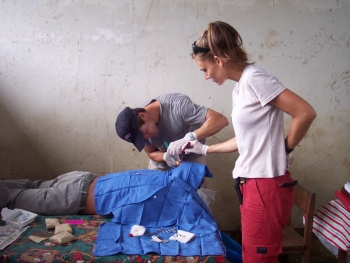
The limited resources in the community and in the clinics themselves give visiting medical volunteers a new perspective on their own practices outside. There is only one shipment of medical supplies for each trip, and the clinics lack electricity, so volunteers must work with local anesthetic, basic equipment and finite supplies. Medical practice is stripped to its bare essence.
Dr. Smith, accustomed to doing micro-surgery back home, spent his time in Peru managing wounds and cutting out growths. He found the experience eye-opening. "You realize how much you have [in the U.S.] and how much you take for granted," he said. "When you're there you have to rethink how you do things."
Volunteers get a mental workout in other ways, too. Because each team has only so many members, they sometimes have to call on long-unused knowledge and skills to work outside their normal sphere. On her trip, Ms. Wong Sing, the only clinician with a surgical background, somehow ended up in charge of obstetrics as well as surgery. It was nerve-wracking but rewarding; she handled two cases of women in labor and discovered that "you're forced to remember what you need to remember" from early training.
"Re-entry" into the developed world, as Ms. Carroll calls it, can cause a bit of a culture shock. After living outdoors for two or three weeks with no electricity, no computers, and no bureaucracy, it can feel strange to come back to the world of modern medicine.
The Benefits and Challenges of Participating
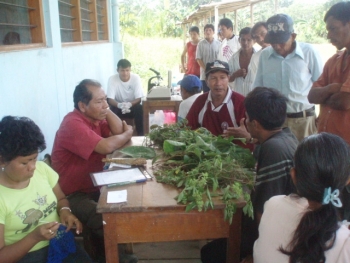
Overall, an Amazon Promise expedition is a positive, even fun experience, but it is extremely challenging. That seems to be what inspires volunteers to come back.
"The first trip basically changes your life," Ms. Carroll said, remembering her own experience as well as years of feedback from other volunteers. They see for themselves how much work needs to be done, and this has a powerful effect.
Ms. Wong Sing's experience truly hit home, crystallizing her idea to start a similar health care organization in Trinidad, her family's country of origin. Dr. Smith feels that his volunteer work in Peru and elsewhere has helped him better understand the challenges of healthcare in different parts of the world, and to be more empathetic.
The sense of responsibility can be almost overwhelming. After her first trip, Ms. Carroll was tempted to stay in Peru to continue treating patients, but soon realized that by living in the U.S. she was in a better position to help the people of Loreto Province. If she lived there, she would have few resources, but from the U.S. she can organize and send resources to Iquitos.
Next Steps
Amazon Promise has made a remarkable difference in Loreto by providing basic primary care and putting health education programs in place. It is difficult, however, to build continuity of care with temporary clinics.
The permanent clinic under construction in Belèn represents a huge stride toward the goal of sustainable health care. The Peruvian government has donated land, an architect is on the project, and the New York chapter of Engineers Without Borders has sent teams to research the site.
The large clinic will provide medical care, including traditional medicine, as well as programs to train village healthcare workers and midwives. It will also enable Amazon Promise to delve into social services. At present, any patients with emotional or psychological problems at the clinics are referred to the shamans. Amazon Promise cannot currently provide the systematic follow-up needed to deal with such things as domestic violence and mental illness.
Amazon Promise is currently talking with Dr. Patch Adams and the Gesundheit Institute about creating social service projects in connection with the Belèn Clinic.
The Belèn Clinic is a logical development for Amazon Promise, but it is an ambitious undertaking. More funding and volunteers are needed to make it a reality.
About the Author

Kathleen O'Malley is a freelance writer and scientific and medical publishing veteran with over 20 years' experience. She maintained a Caring Bridge blog, Kancer Kitty, that details her experience with breast cancer. She can be reached at kitty.omalley@gmail.com.
About Angels in Medicine
Angels in Medicine is a volunteer site dedicated to the humanitarians, heroes, angels, and bodhisattvas of medicine. The site features physicians, nurses, physician assistants and other healthcare workers and volunteers who reach people without the resources or opportunities for quality care, such as teens, the poor, the incarcerated, the elderly, or those living in poor or war-torn regions. Read their stories at www.medangel.org.